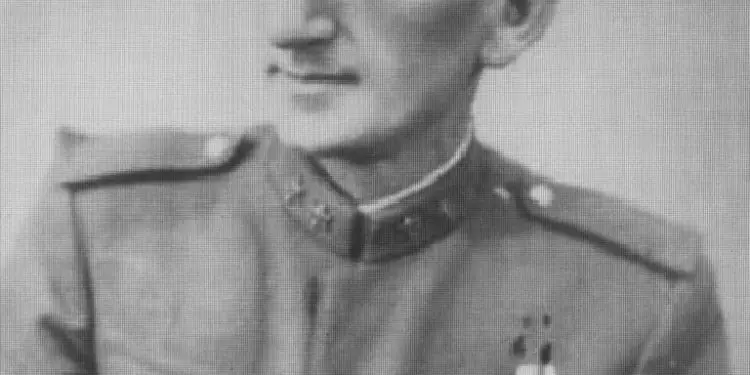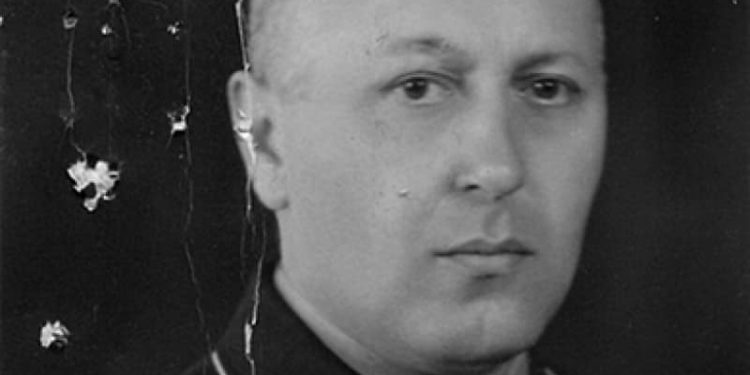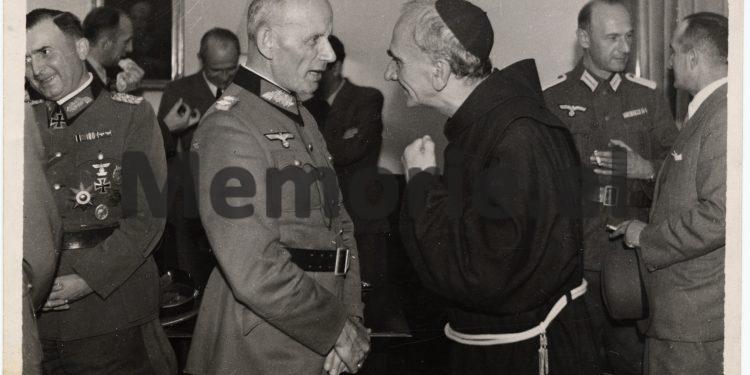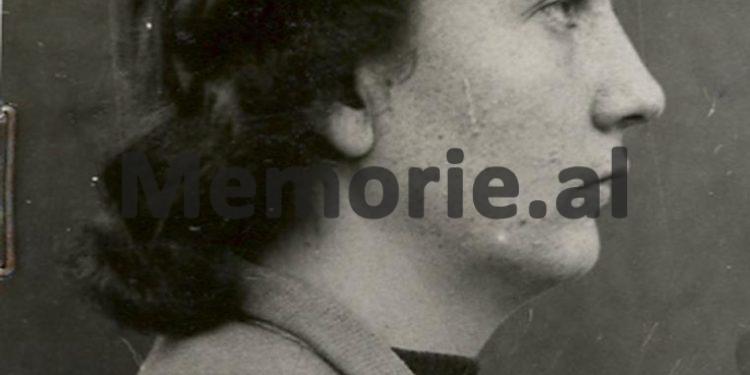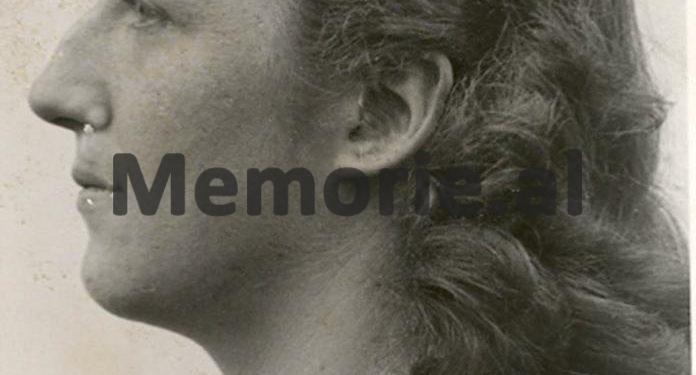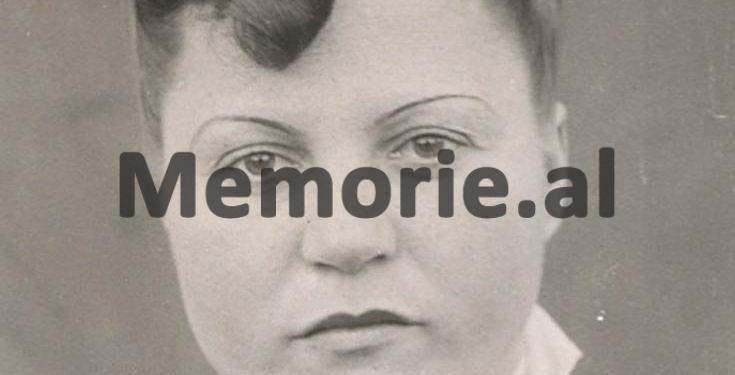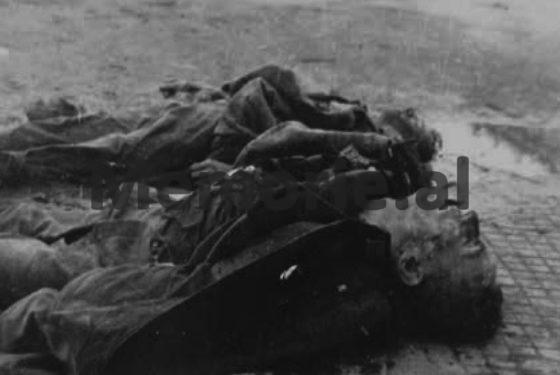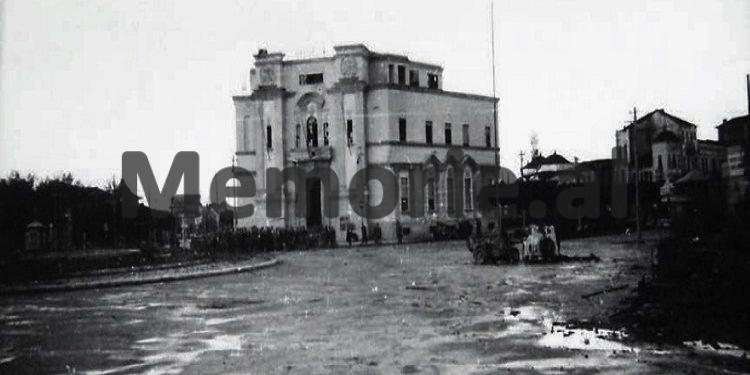An investigation into this matter took place in 1984, as an untrue rumor had circulated, as if Nuçi Tira, (former colonel, head of the Internal Branches, in Lushnje, Pogradec, etc.), who was effective during the War of Mehmet Shehu’s 1st Assault Brigade, was the person who had killed Petraq Pekmez. Touched by these words, proven to be untrue, as well as aiming for the truth, Nuçi Tira set about clarifying this issue. He had met Petraq in October 1944, at Vangjel Peristeri’s house. Petraqi had helped with a lot of information, but in the end he was killed. During this time, the script of a Kinostudio film “New Albania” was being discussed, about these events. The director had contacted many people, including Bako Dervish (former Major General, Corps Commander, etc.). Referring to the letter that Nuçi Tira sent on 28.1.1984 to the Minister of Internal Affairs Hekuran Isai, when the director asked Bako Dervish, he answered: “Hold on, boy, don’t get involved in this business, because you will cause us trouble. I, the partisans, killed Petraq Pekmez.” Bako Dervishi had confessed that; after Petraqi had arrived in Linza, they (besides Abaz Fejzo and Zija Kelliçi) interrogated him as a defendant, torturing him, with the request to reveal the secret network of the German Gestapo. In the end, Bako and Abazi decided to shoot him and for this they made a kind of court decision, but Zijai refused to sign. Even after the war, Bako asked Zijai (rector of the State University of Tirana, then committed suicide), to sign that decision, but he refused. The director told Nuçi Tira that Petraqi had been connected to the National Liberation Movement and that he went to the Germans with the permission of the party (Drit Çaushi, through his brother, Trajan Pekmezi, later a martyr). It also turned out that Petraqi had a relationship with Naun Bezhan. Naun Bezhani himself declared that; from July-August, he was in contact with Vangjel Peristeri, but he did not know Petraq. From the data, he understood that the information (about 50-60 of these) came from an important office of the Gestapo. There is no doubt that their only source was Petraqi. In both cases, the meeting point is Vangjel Peristeri. Another doubt Nuçi Tira cast was the fact that there had not been a secret meeting between Mehmet Shehu and the German general, Fiztum those days. These doubts were rumored in 1983, but it was not certain whether they were made after Mehmet Shehu “poly-agent” came out or if there really were grounds for such a meeting. In the analysis of the evidence, the most important fact was that; since the evening of November 16, 1944, the Germans left Tirana via the “Kavaja Road”, without being hindered by the partisans. Following the “investigation” of this case, Nuçi had met in 1983, former partisans Vangjel Priftanji and Foto Xhitoni. Vangjeli gives an interesting testimony, which is not only related to Petraq Pekmez, because there were others who took him hostage. According to his testimony, after being told that Petraqi had also been arrested, Mehmeti gave the order to shoot him and the others, because that “trash” was not needed. “Idriz Seiti took him and, together with 5-6 others, stabbed and shot him in Zall Herr, in the river” – testified Vangjel Priftanji. After a week, Nuçi asked Vangjeli for a statement, but he refused to give it to him.
-Where did the agreement get stuck and why was it not realized-?!
The 104 Albanian prisoners held by the Germans in Pristina could have been saved. All it took was the hard work of Petraq Pekmez, a little intuition, and they would all return home. Politics is often a bargain, where one has to be nimble to profit.
The story becomes interesting, when in Kukës on 5.9.1944, in an attempt to get out and escape from Albania, the partisans arrested the German women; Elsa Koch, Irmgrand Tennius and Erna Schubert. The first was the girlfriend of General Josef Fitztum (1896-1945). The German’s weakness for his girlfriend and her friends were a good opportunity to exchange captives. Partisans got a good opportunity to make valuable exchanges.
On 18.11.1982, the veteran Xhemal Meçe gives a testimony about what he remembered related to this, the talks with the Germans and the end of Petraq Pekmezi’s life. Xhemal Meçe, from December 1943, was transferred from the “Hakmarrje” Battalion, in Tirana, to the KPSH circular of Tirana. You had told Trajan Pekmezi (later a martyr) that his brother, Petraqi, worked for the Movement. Arrested in May 1944, Meçe, since August 20, 1944, was in the Pristina Camp, held by the Nazis. He further recounts the conversation with Petraq Pekmez, in September 1944, regarding the exchange of prisoners. The German general Fitztum asked Petraq to mediate with the partisans for the release of the three German women. After Petraqi told him that it was impossible, he demanded the release of Xhemal, who was being held under arrest, as well as some to others, so that with these, he could start efforts to find women. Fitztum granted his request. After Petraqi took Xhemal out of the camp, they both went to Prizren. There, from the Gestapo command, Petraqi, by phone, asked Fitztum for the release of 20-25 other prisoners. The general agreed, but not more than 4 people. Xhemali gave the names of Qazim Vaqarri, Zeqir Lika and Pjetër Deda, who were released. Petraqi appointed the fourth, a Tirana named Ibrahim. After that, Petraqi, with the driver Riza Doçi (Zeqir Lika’s uncle), went back to Pristina, to secure the permits. They returned the same day to Prizren. Petraqi also freed a corsair and took those he had secured before. They all went to Shkodër, and then to Tirana. Xhemali presented himself to Hysni Kapo, to ask him to intercede for the release of the 3 German women, according to the agreement they had made. He communicated with Enver Hoxha and told him that he would reply. After 3 days, Petraqi and Xhemali went to meet General Fitztum in Tirana, with the conditions given by Hysni Kapo. Here the partisans did not adhere to a unique agreement, but changed it.
Initially, they demanded the release of prisoners from Pristina and Tomor Sinan, from Elbasan, arrested a year ago. The exchange took place in Tirana. The German general accepted the conditions, but said that Tomor Sinani had been shot and this point of the agreement could not be implemented. For the release of the internees in Pristina, it did not undertake their transport. After this point was accepted by Xhemali, that they would do the transport themselves, the general agreed. At the same time, the families of the internees were informed. By not sticking to this agreement, the partisans got one new order. On 30.9.1944, Enver Hoxha requested (telegraphed) the leaders of the Headquarters of the 1st Corps, commander Dali Ndreu and commissar Hysni Kapo: “We insist on releasing the English general Devis, who they captured in the last month of this year , play and hand them over to us. This way of exchange is of great political importance, therefore it must be insisted”.
Below is the note for Mihal Prifti: “The request for General Devis is first, then Tomor Sinani and the Pristina camp”. So instead of showing skill, to save as many Albanians from death, Enver Hoxha wanted to gain political points, as if he had in his hands the life of General Devis, who might not be in Albanian territory at all.
Hysni Kapo forwarded Hoxha’s order to Xhemal, while he passed it on to Petraqi. Knowing the Germans well, when it came to breaking the agreement, Petraqi rightly concluded that they were “on the edge of the precipice”, but they would try. Xhemal Meçe remembered this moment like this:
“Petraqi began to present the case to the general. I noticed his face that started to darken, looking at Petraq with attention, he was the apple of my eye. After Petraqi finished speaking, he didn’t say anything else, but hit the table with a strong fist, as much as she had, scattered around the room. He turned to Petraqi, shouting with all his might: “out”.
Xhemali stayed alone with the general, while he cursed to himself and marked on the map. After 5 minutes, he called Petraq again and told him that; Davis was in Berlin and, it was not in his hands, but he would intervene for surrender, in any legation of the intermediary states. Although angry, he stuck to the agreement.
The plan began to be made for the release of the Albanians in Pristina, i.e., for the cars they would come with, etc. Xhemal Mece follows:
“Unfortunately, in the evening, a partisan unit on “Bajram Curri” street, near the Madrasa, carried out an important action, burning several cars and killing more than 12 Nazis, members of their party. For this, the German command to take revenge, burned a part of the neighborhood around the place of action, arrested more than 50 men of the neighborhood, keeping them in readiness to shoot them, and shot more than 100 internees, Camp of Pristina, district of Tirana. At 4:00 a.m. this night (October 23, 1944, note), Petraqi comes to the base where I was in alarm and explained to me that; you called General Fitztum to notify me, to inform the partisan headquarters, about the reason for the shootings in Pristina, so as not to break the agreement because the shootings would be compensated with prisoners from other prisons”.
Xhemali again conveyed the proposal to Hysni Kapo. Meanwhile, Petraqi managed to save the 50 men who were being held hostage from being shot. After a day, the General Staff refused to accept the new agreement. Xhemali analyzed that Petraq Pekmezi had saved at least 100 Albanians from being shot by the Germans. According to him, Petraqi and the driver disappeared on 16.11.1944. Memorie.al




